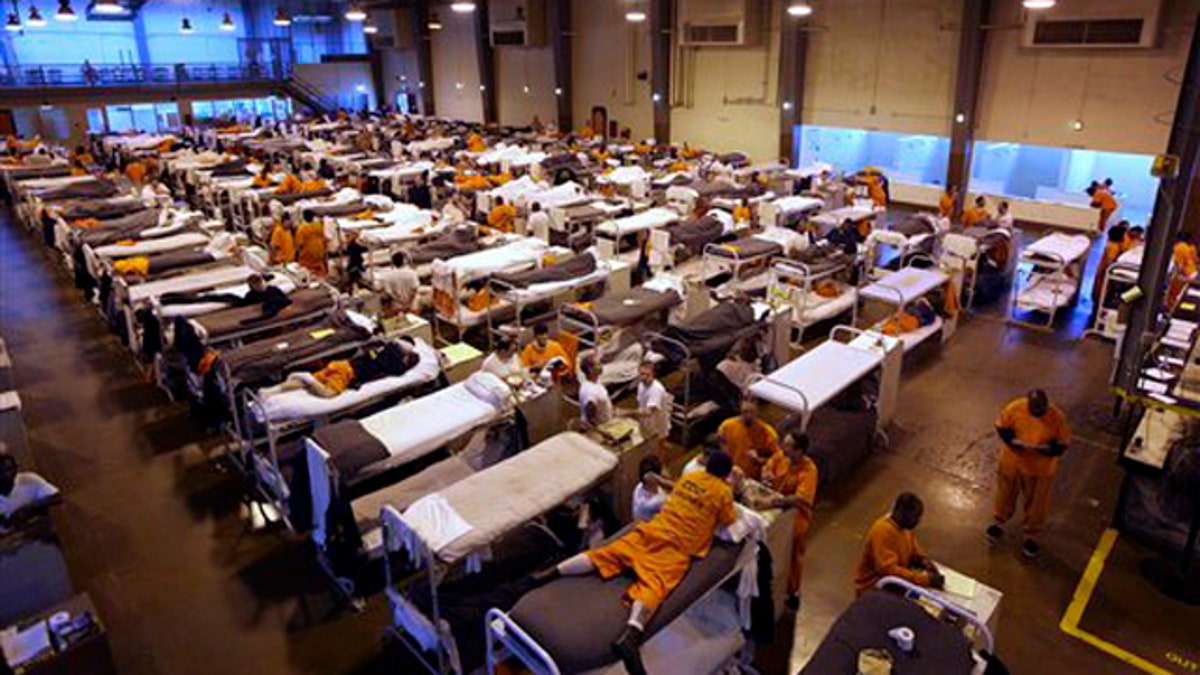
In this May 20, 2009 file photo, several hundred inmates crowd the gymnasium at San Quentin prison in San Quentin, Calif. (AP)
With California facing a Supreme Court order to reduce its prison population by as many as 46,000 inmates, the cash-strapped state will have plenty of options to consider -- all of them bad.
By any standard, finding a new home for tens of thousands of state prisoners is daunting. Factor in this particular state's structural budget problems and strict sentencing laws, and the task is monumental.
Advocacy groups and officials are looking at a combination of options to relieve the state's overcrowded prisons and comply with the court. But it won't be easy. Local jails will probably receive a slew of new prisoners. Inmates might have to be released ahead of schedule. Concerns about funding and space and public safety hang over the entire debate.
Pat Nolan, vice president of a faith-based group trying to battle recidivism, said there's no "silver bullet" to California's overcrowding. At the same time, he blamed California's lawmakers for putting themselves in this position.
"They tried to do it on the cheap. They voted for long sentences, but refused to provide enough prisons to house the people," said Nolan, a former California lawmaker and ex-inmate himself.
So far, the No. 1 option being pushed by Gov. Jerry Brown is a plan to send new offenders and parole violators accused of minor crimes into the county jails instead of the state system. Officials hope that over the next few years this can reduce the prison population by about 40,000.
The problem is that the state will need to pay the local governments millions of dollars to house its prisoners, and the Legislature has not yet provided Brown the money to implement his plan.
County officials are backing the governor's plan but want to make sure there are legislative and constitutional guarantees so they receive enough funding.
"If they don't (secure the funding), everybody's going to be in a world of hurt," Paul McIntosh, executive director of The California State Association of Counties, told FoxNews.com.
The other challenge is "capacity" at the local level, said McIntosh, whose association is calling on the state to make sure local officials have the resources to "assure an orderly transition."
Other options, which also would involve more state funding, would be to send prisoners out of state or simply build more prisons.
The Department of Corrections says it does not want to release inmates -- a population that is difficult to thin due to the state's three-strikes sentencing laws and high recidivism.
Nearly 70 percent of felons return to the prison system within three years, according to a 2010 state study. The three-strikes laws keep them in the system longer. The two factors contribute to a revolving door in California, making it that much harder to ease the chronic overcrowding that prompted the court rulings in the first place.
But Kent Scheidegger, legal director with the Criminal Justice Legal Foundation, expressed concern that the state will end up complying with the court by releasing criminals early -- either setting state prisoners free or releasing inmates at the local jails to make room for those who would otherwise be in the state system.
"Unless there's a massive jail construction project, I can't see how that's going to work without impacting public safety," he said. "Every option has drawbacks."
Supreme Court Justice Antonin Scalia, who read part of his dissent to the ruling from the bench Monday, called the decision "perhaps the most radical injunction" in U.S. history, expressing concern that the state would release dangerous criminals onto the street.
But officials are trying to stay positive.
Scheidegger said local jails could be built up to house the expanded inmate population, something that would be cheaper than erecting new state prisons. Though he expressed concern about loosening the state's sentencing guidelines, he said California could relieve overcrowding by easing up on punishments for minor parole violations. Nearly half of returning prisoners in California are sent back because of parole violations.
Nolan agreed. He said lawmakers should pass legislation to ensure ex-inmates don't return to prison over technical parole matters. And he said that by getting ex-inmates on the right track, groups like his, Prison Fellowship, can help keep them out of the criminal justice system.
Despite the challenges ahead, Nolan said the court ruling was the right move, given prison conditions.
"In the long run, I think the prison system will be better. It was really out of control," he said.




